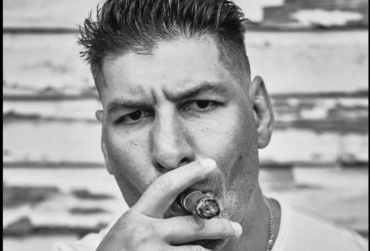
The Orthodox Jewish Community Gave Me Hope After I Was Abused In My Secular Family
I have had tortuous abuse in my life, the silence being the factor which I’ve suffered from the most. The feeling of always having to quiet myself for fear of my secrets being out. It may sound like what a spy goes through after debrief and reintegration into civilian life, but it is the reality of what my experience since I was around 19 has been. I constantly fear that I’ll be exposed as a monster for something did to me by another person, when I was in no way able to respond. Now, I’m starting to find my voice.
Having been raised secular, I sought out help in the Orthodox Jewish community because the Orthodox Jews I’ve met relate to my soul. They empathize with the pain and suffering I’ve gone through. As a keen observer of cultural habits from many years of traveling and living abroad with people from completely different cultural backgrounds, I have noticed a stark difference between religious Jews and the secular world. Orthodox Jews really listen to what a person says and think about it before offering a reply. In my experience, instead of shunning bad news, the Orthodox Jews I know aren’t afraid to look and shine a light on it.
This is my first time “exposing my wound” in such a public way. “Silence has the rusty taste of shame,” a woman who came out with her abuse story once wrote. I have said that line so many times. When is it the right time to talk about sexual abuse and its effects in a family? My honest answer: never. Nobody gets it. Abuse has a case history. It starts in one place and the stories of its effects extend. It often leaves me without adequate words to explain it.
I have lived through family sexual abuse by a sibling. The mark it left on me continues to cause reverberations in my life. I suffer from mental illness and the real and imagined limitations on my potential. I have lived through other abuses of this nature too. All of this piles up as if it were a chain reaction accident on the freeway.
Living with pent-up rage and fear trapped inside me like a silenced scream has taken its toll. A large portion of my active memory and executive function operating system power has been devoted to suppressing that scream and twisting my brain to “accommodate” the unspeakable things I underwent both at the time of the abuse and in my family’s response. I’ve also had to compensate for the strange ways I’ve had to relate to the world in the absence of nurturing relationships while growing up. Imagine always feeling like your comment or question is going to be the punchline of a joke. I tried explaining this all to my parents when I had a major breakdown and their response was, “Get out.” What adequate words could I have when my parents silenced me? That is when my thoughts started to deepen. When did I decide to let abuse happen to me? Why did I feel like the blame for it fell on me?
Abuse is an injury to the soul. Rabbi Shimon Jacobson says, “The response can be worse than the abuse.” I know all too well what “salt in the wounds” means. When at my lowest point, my family was still telling me to “shape up” and get a job, to suffer the double agony of being stigmatized for mental illness was beyond painful. Rabbi YY Jacobson, in words I’ve said myself, describes abuse as “a murder of the soul.”
I’ve found that only the Orthodox rabbis I’ve encountered truly appreciated the spiritual implications of what I endured. These people care about other people: not how much money you make, not what cars you drive, not how you speak or what you know. They want you to be a part of their mishpacha—the greater world of Orthodox Jewry in general. Knowing that I am wanted, after being rejected so thoroughly by my own family sent me to the Orthodox world. Here, I experience a type of love I never received in my own upbringing – a true unconditional love.
Some readers might point out that it was the Orthodox response to their own past abuse which inhibited their pleas and made their lives all the worse. I am sorry for their experiences and understand that in some Orthodox families, help such as therapy could be taboo. My heart goes out to the abuse victims from such families. I come to Orthodoxy as a ba’al tshuva later in my adult life, so I have been selective with whom I share my past. The messy and painful details of my personal life are at stake—though paradoxically, I need to tell people about it in order to get help I need to open up.
When my life was falling apart and I was being forced out of living at home, I was in correspondence with a rabbi, a real talmid chocham, whom I had the great fortune to meet in Israel. Both he and his wife shared the agony of my predicament. They wrote, “I so feel the pain of the awful circumstances you’re going through, I empathize with you, I want to feel with you, and protect you because this offends me.” That response broke my heart open and let me feel. Of all the people around me then, they were the only ones who empathized with me unconditionally. In my parents’ house, I had no one. Yet somehow people who I’d only met once, this rabbi and his wife who were half a world away, had more wits about them than my own parents. They were sensitized to the suffering of souls. Many rabbis embody this unconditional love and unending hope.
Some people who have suffered abuse take their own lives because help persistently alludes their grasp. I have been through homelessness because of it. I have had to run for and almost fight for my life because of it. I have gone to the brink of madness and back several times because of it. Most damningly, family is an essential ingredient to recovering from any kind of illness. Yet on whom does a person rely when their family is the one who hurt them?
Besides caring people, the Orthodox Jewish community is building more and more resources for survivors. There is help in the form of funds for each therapy session for qualified therapists and organization Amudim and Bayit Cham in Israel. Bayit Cham addresses the social, economic, spiritual and emotional dimensions of healing for the abused. They write, “The myth that emotional distress is something to be ashamed to speak of, even at the price of breakdown and total collapse, must be shattered…[We give a] voice to those who previously were kept hidden and who were yearning to be heard.” Abuse is a dark mark on the soul that needs to be healed with light. Those who come to them are “finally able to let go of their crippling shame as they met staff who saw their innate Spark of G-d that every human being possesses and who felt shared responsibility for their wellbeing.” That’s the same shame that I hold onto and long to be free of.
It is easy to fall into a major depression when thinking over the laundry list of painful and unfair episodes I’ve been through in my life, the time wasted I’ve spent walking the tight-rope of mental health and wondering if I’ll ever “get there.” It is not a struggle I am over yet. I hurt, and I feel sad. I have anger toward Hashem, which, as I touch the deep core of my emotional self, is just beginning to come forth now. Why am I alive? Why did Hashem put me here? What is the purpose to my life? Was I only put on this earth to experience injustice and sadness?
As a person recovering from abuse, it can be off-putting to me when a relative stranger tells me they love me unconditionally because I was born a Jew. I bristle at that love because I wasn’t raised with it. I am still not used to it, so I ask those around me to grant me patience.
The promise of an Orthodox life is one worth living for. My beautiful heritage and birthright gives me hope. It gives me a future to think of which is built on an unconditional relationship with God and to others. It is an unending mystery. No matter if I’ve suffered abuse, I am hopeful that walking an Orthodox Jewish path will bring me to salvation no matter who and what I had to rely on to get there.
If you found this content meaningful and want to help further our mission through our Keter, Makom, and Tikun branches, please consider becoming a Change Maker today.






